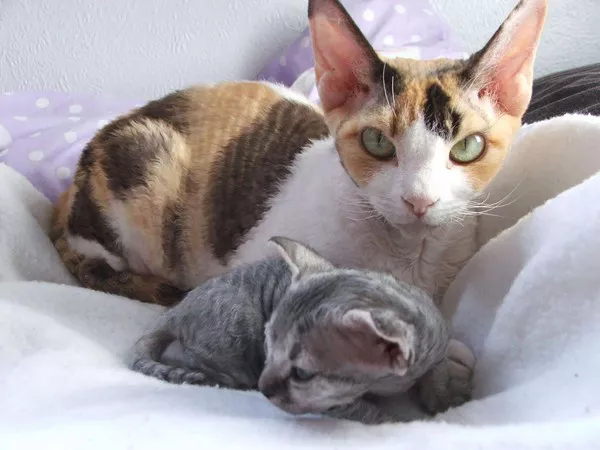Devon Rex cats, known for their playful personalities and distinctive appearances, are often discussed in conversations about hypoallergenic pets. Many potential pet owners with allergies consider the Devon Rex as a viable option due to their unique coat and shedding patterns. This detailed article explores the suitability of Devon Rex cats for individuals with allergies, examining the science behind pet allergies, the characteristics of the Devon Rex breed, and practical advice for managing allergies.
Understanding Pet Allergies
Pet allergies are a common concern for many individuals, affecting approximately 10-20% of the population worldwide. These allergies are typically triggered by proteins found in the pet’s dander (dead skin cells), saliva, and urine. Contrary to popular belief, pet hair itself is not an allergen, but it can collect dander, dust, and pollen, contributing to allergic reactions.
Key Allergens in Cats: The primary allergen in cats is the protein Fel d 1, produced primarily in the cat‘s saliva and sebaceous glands. When cats groom, they spread this protein across their fur, which later becomes airborne as the hair sheds and dander falls off.
Devon Rex Cats: Breed Characteristics
Physical Attributes: The Devon Rex is a breed distinguished by its soft, short, and curly coat, large ears, and slender body. They are often described as having an “elfin” look due to their unique facial features and expressions.
Coat and Shedding: Unlike most cats, the Devon Rex has less fur and fewer layers in their coat, which consists mainly of down hair – the soft, fine undercoat. This is significant because it suggests that Devon Rex cats may shed less than other breeds, potentially releasing fewer allergens into the environment.
Are Devon Rex Cats Hypoallergenic?
The term “hypoallergenic” implies that something causes fewer allergic reactions, not necessarily that it is entirely allergen-free. When it comes to Devon Rex cats:
Reduced Shedding: Due to their unique coat, Devon Rex cats may shed less than other breeds, potentially making them a better choice for allergy sufferers.
Saliva and Dander Production: Despite their reduced shedding, Devon Rex cats still produce saliva and skin dander containing Fel d 1, the primary cat allergen.
Therefore, while no cat can be considered truly hypoallergenic, the Devon Rex may be less likely to trigger allergic reactions compared to more heavily shedding breeds.
Scientific Research on Cats and Allergies
Research into hypoallergenic pets often yields mixed results. A study published in the “Journal of Allergy and Clinical Immunology” indicated that there are no significant differences in the production of Fel d 1 among different cat breeds. This finding suggests that individual cat habits and biology might be more impactful than breed alone when it comes to allergen production.
Managing Allergies in Households with Cats
For individuals who are allergic but still wish to own a Devon Rex, or any cat, there are strategies that can help manage allergic reactions:
Regular Grooming: Bathing and grooming cats regularly can help reduce the amount of dander and saliva on their fur. For Devon Rex cats, who have delicate coats, it’s important to follow a grooming routine that prevents skin dryness.
Air Filtration: Using HEPA (High Efficiency Particulate Air) filters in the home can reduce airborne allergens significantly.
Clean House: Frequent vacuuming with a HEPA vacuum cleaner, dusting, and washing bedding where the cat sleeps can also minimize allergens.
Designate Allergen-Free Zones: Keeping the bedroom or other areas of the home off-limits to the cat can help reduce exposure to allergens.
Allergy Medications: Over-the-counter or prescription allergy medications can alleviate symptoms, but it’s best to consult with a healthcare provider for a long-term management plan.
Considering a Devon Rex Cat: Points to Ponder
Potential owners should consider several factors before adopting a Devon Rex cat:
Interaction and Bonding: Devon Rex cats are known for their sociable and playful nature. They often seek close contact with their owners, which could be a concern if touching the cat triggers allergic reactions.
Health Considerations: Like all breeds, Devon Rex cats are susceptible to specific health issues, such as hereditary myopathy and patellar luxation, which should be considered when looking at the long-term care of the pet.
Conclusion: Are Devon Rex Cats Good for Allergies?
While the Devon Rex may be a more suitable option for allergy sufferers due to their unique coat and potentially lower shedding, they are not completely allergen-free. Individuals with severe allergies might still experience symptoms. It’s essential for potential owners to spend time with the breed to gauge their personal reaction before making a decision.
Ultimately, the decision to adopt a Devon Rex should be based on thorough research and consideration of the individual’s specific allergic sensitivity, lifestyle, and willingness to implement ongoing allergy management strategies. With the right precautions, owning a Devon Rex can be a joyous and fulfilling experience, even for those with allergies.

























